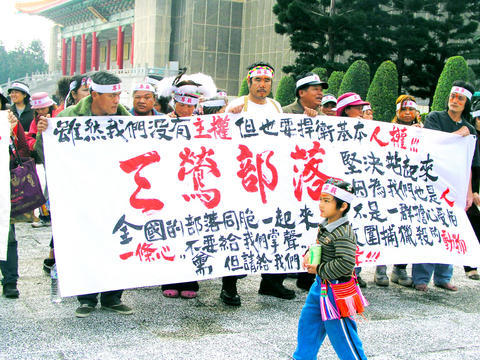The Taipei County Government decided on Thursday to suspend the planned demolition of the riverside dwellings of a group of Aborigines in Sindian (新店), ending a weeks-long dispute over a relocation plan.
During a meeting with a group of Aborigines and activists, Taipei County Commissioner Chou Hsi-wei (周錫瑋) promised that the government would not tear down homes in the Sijhou Township (溪洲部落), which resides on the banks of the Sindian River, before it finds a location to build a new community.
The meeting came after county officials forcibly demolished homes of a similar community in Sansia Township (三峽) on Feb. 29.

PHOTO: CNA
Aboriginal Legislator May Chin (高金素梅) said at the meeting that many people from the Sijhou Township do not have stable jobs and therefore cannot afford to live in a residential complex in Sansia, as the county government had planned.
May Chin suggested that the county government find another location to accommodate the Aborigines and allow them to take part in the planning of their new homes.
Chou promised that the county government would consult with Sijhou Township members by organizing meetings starting next week and build a community with distinct Aboriginal features.
Chou also said that the county government would budget NT$10 million (US$325,000) to build the new community.
However, Chang Chu-miao (張租淼), a spokesman for the Sijhou Aboriginal Community Self-Help Organization, said the government should respect the residents' wishes to stay in their current location.
"If the county government wants to help, it should respect the rights of Aborigines to choose where they live," he said.
"We hope the more than 200 residents can stay where they are now," Chang said, adding that the land belongs to the Aborigines, not the government, and that they would defend their ancestors' land.

RESOLUTIONS DEBATE: Taiwan’s allies said that UN and WHA resolutions cited by China and other nations ‘do not determine Taiwan’s participation in WHO activities’ A proposal to invite Taiwan to this year’s World Health Assembly (WHA) was rejected on Monday, resulting in Taipei’s absence from the annual meeting for a ninth consecutive year, although partners spoke up for Taiwan’s participation at the first day of the meeting. The first agenda item after the opening was a “two-on-two debate” on a proposal to invite Taiwan to participate at the WHA as an observer. Similar to previous years, two countries made statements in favor of the proposal, while two others expressed their opposition. Philippine Secretary of Health Teodoro Herbosa, president of the 78th WHA, accepted the WHA General Committee’s

Palauan President Surangel Whipps Jr arrived in Taiwan last night to kick off his first visit to the country since beginning his second term earlier this year. After arriving at Taoyuan International Airport at around 6:30 pm, Whipps and his delegation were welcomed by Minister of Foreign Affairs Lin Chia-lung (林佳龍). Speaking to gathered media, the Palauan leader said he was excited and honored to be back in Taiwan on his first state visit to Taiwan since he was sworn in this January. Among those traveling with Whipps is Minister of State Gustav N. Aitaro, Public Infrastructure

Premier Cho Jung-tai (卓榮泰) on Friday laid out the Cabinet’s updated policy agenda and recapped the government’s achievements ahead of the one-year anniversary of President William Lai’s (賴清德) inauguration. Cho said the government had made progress across a range of areas, including rebuilding Hualien, cracking down on fraud, improving pedestrian safety and promoting economic growth. “I hope the public will not have the impression that the Cabinet only asked the legislature to reconsider a bunch of legal amendments,” Cho said, calling the moves “necessary” to protect constitutional governance and the public’s interest. The Cabinet would work toward achieving its “1+7” plan, he said. The

Nvidia founder and CEO Jensen Huang (黃仁勳) hosted a dinner in Taipei last night with key Taiwanese suppliers to celebrate the successful mass production of the company’s new Blackwell AI systems. Speaking to the media earlier yesterday, Huang thanked Nvidia’s Taiwanese partners for their contributions to the company’s ecosystem, while also sharing his plans to meet with Taiwan Semiconductor Manufacturing Co (TSMC) founder Morris Chang (張忠謀). In response to rumors that Nvidia will launch a downgraded Hopper H20 chip for China in July, Huang dismissed the reports, saying, “That is not true.” He clarified that there